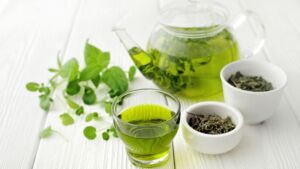Having chapped lips is a frustrating ailment. It hurts to laugh, you’re self-conscious, they might even bleed… And no matter how many times you reapply your chapstick, dryness keeps winning.
Let’s start there: with your chapstick.
Why your chapstick is actually making your lips more chapped
Many chapsticks contain petroleum, which is often contaminated with carcinogenic chemicals like PAHS. It’s a cheap moisturizing ingredient advertised as being “safeâ€, so companies continue to use it.
What else is there? Parabens, fragrance (which can mean anything) and other ingredients that you really don’t want on your mouth. Plus, these brands often don’t deliver the soft lips they promise.
natural ingredients for lips
Last year we talked about mistakes people make that prevent them from keeping their lips healthy and kissable. This time we want to talk about some common, natural ingredients that can help keep your lips healthy. Chances are, you already have a lot of these ingredients at home.
1. Sugar
Failing to exfoliate is by far the most common mistake people make when it comes to caring for dry lips (think about it, you probably ignore your lips each time you cleanse and exfoliate your face). Once you get dry, flaky skin on your lips, even the best moisturizer in the world isn’t going to work. You’ve got to remove that stuff on the surface, first.
exfoliate gently
Sugar is a great natural ingredient for this job—just be sure you mix it with a moisturizing oil, like jojoba or olive, so it’s not too harsh. Remember that the lips are made up of thin, fragile skin, so the idea is to exfoliate gently. And remember to use organic sugar from a reputable source.
Tips: Jojoba oil has several uses like combining a teaspoon of sugar with a teaspoon of your jojoba oil, olive oil, sunflower oil, or other moisturizing oil to create a scrub. Scrub on lips for about 30 seconds, and then rinse off. Repeat one to two times per week, depending on how chapped your lips get. Follow immediately with moisturizer. (See below.)
2. Papaya and Honey
There are two ways to exfoliate—manually, by scrubbing (as noted above), and chemically, with natural enzymes and hydroxy acids.
Raw honey is a natural source of a mild hydroxy acid that exfoliates without being overly harsh. Papaya is a wonderful source of natural enzymes that help break down the icky buildup on lips, leaving them softer and more moisturized.
Tips: Try our Coconut Honey Mask on your lips—it works great! Leave it on for 10-15 minutes and then rinse off, or you can even use it as a regular lip balm. Another tip—mash up a ripe papaya and apply to lips. Again, leave it on for a time and then rinse it off. Alternate between using sugar and a natural enzymatic exfoliant like honey or papaya to keep lips smooth.
3. Zinc Oxide
Oh how often we forget this! We slather sunscreen on our faces but leave our lips vulnerable. Still, UV rays cause a lot of damage to lips, even more so than to other types of skin because lips are so thin and fragile.
Tips: You can look for natural lip balms with sunscreens. Badger, for example, has a Sunscreen Lip Balm with an SPF of 15—it includes safe zinc oxide and natural oils.
4. Natural Oils
With so many beautiful oils in the world, it’s a shame that so many chapsticks use petrolatum, aka petroleum jelly, as a moisturizing ingredient. It just doesn’t do the same thing for your lips as plant-based ingredients do.7 Natural Ingredients to Help Your Chapped Lips
Here’s why your lips love oils:
- The skin accepts them easily: Oils are easily absorbed into the skin, so they tend to moisturize on a deeper level than synthetic ingredients.
- They contain essential fatty acids: Oils are full of essential fatty acids, which help protect the skin from environmental stressors and moisturize skin—resulting in a plumper, younger-looking appearance.
- They contain natural antioxidants: These protect the skin from environmental stressors.
Tips: You can use a natural oil directly on lips for moisturization, or try a penetrating combination of oils in our Herbal Facial Oil.
Natural oils to try:
•   Coconut oil
•   Olive oil
•   Jojoba oil
•   Almond oil
•   Sunflower oil
•   Hemp seed oil
•   Apricot kernel oil
•   Avocado oil
•   Grapeseed oil
5. Aloe and Vitamin E
Moisturizing oils will help, but if you want to add an extra boost, you need to add some aloe and Vitamin E. Aloe and Vitamin E help to soothe and even the appearance of skin tone.
Tips: Both aloe and vitamin E (in its natural form) are found in most Annmarie Skin Care products. You can try the Herbal Facial Oil, Anti-Aging Facial Oil, or Coconut Body & Face Oil on your lips, or make your own balm with beeswax, aloe, vitamin E, and a bit of coconut oil.
Melt the beeswax, add in the coconut oil (you can add some honey too if you like), blend, add in some vitamin E, pour into a container and let cool. For some flavor, add in a few drops of vanilla or peppermint essential oils.7 Natural Ingredients to Help Your Chapped Lips
6. Green Tea
You probably use an anti-aging serum for your face. It’s time to give your lips the same consideration! They are exposed to the same environmental elements as the skin on your face every day, plus they’re subject to the breakdown effects of food, beverages, and your own saliva. They need restorative ingredients to bounce back and stay looking smooth and healthy.
potent yet gentle
Green tea is one of the most potent natural anti-aging ingredients we have. Not only is it a powerful antioxidant, but it can also soothe and reduce the appearance of fine lines and wrinkles.
Tips: Simply apply a cool tea bag to your lips for about five minutes at night (if you brew green tea in the morning, put the tea bag in the refrigerator so you can use it later).
You can also make your own green tea lip balm by melting some beeswax, stirring in some of your favorite moisturizing oil, and adding in some potent green tea. (There are a lot of recipes online for green tea lip balm!)7 Natural Ingredients to Help Your Chapped Lips
7. Beetroot, Carrot Juice, or Pomegranate
Lipsticks can be especially drying in winter, and lip glosses are often just as bad. If that’s not enough of a reason, studies have shown that many lipsticks are contaminated with lead.
But look around! Nature has some beautiful colors going on, and you can harness them to naturally beautify yourself.
Tips: Give your lips a break by adding color with natural ingredients instead. Beetroot, carrot, and pomegranate juice all work well—try each to see which one is best for you.
Put some of the juice on a cotton swab and apply to lips at night—be careful, as it can stain other areas of skin as well. (For best results with pomegranate, crush the seeds to make the juice.) The next morning, you’ll have natural color on your lips that will last for hours.

